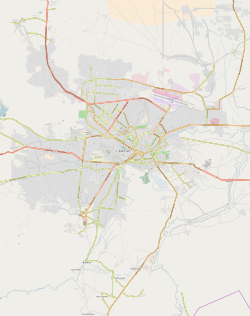
Back تفجير كابول يوليو 2016 Arabic Terroranschlag in Kabul am 23. Juli 2016 German Atentado de Kabul de julio de 2016 Spanish بمبگذاری مرداد ۱۳۹۵ کابل Persian Kabulin pommi-isku 2016 Finnish Attentat du 23 juillet 2016 à Kaboul French जुलाई २०१६ काबुल हमला Hindi Ահաբեկչություն Քաբուլում (2016) Armenian Pengeboman Kabul Juli 2016 ID ქაბულის ტერაქტი (ივლისი, 2016) Georgian
| July 2016 Kabul bombing | |
|---|---|
| Part of the War in Afghanistan (2001–2021) | |
 A few hours before the bombing | |
 | |
| Location | Dehmazang Square, Kabul, Afghanistan |
| Coordinates | 34°32′N 69°10′E / 34.533°N 69.167°E |
| Date | 23 July 2016 c. 14:30 AFT[1] (UTC+04:30) |
| Target | Shia Muslims |
Attack type | Suicide bombing[2] |
| Deaths | 97+[2][3][4] |
| Injured | 260[5] |
| Perpetrators | |
| Motive | Anti-Shi'ism |
| Part of a series on |
| Hazaras |
|---|
 |
|
|
|
On 23 July 2016, a twin bombing[6] occurred in the vicinity of Deh Mazang square in Kabul, capital of Afghanistan, when Enlightenment Movement protesters, mostly from the Hazara ethnic group, were marching against a decision to bypass their region in the development of the TUTAP mega power project.[3][7] At least 97 people were killed and 260 injured.[2][3][4] The terrorist group Islamic State of Iraq and the Levant claimed responsibility; however, the same group later on refused it. Some Hazara protestors allege that Afghan president Ashraf Ghani was behind the attack. They believe that Ashraf Ghani government was abetting the terrorists who were responsible for the attack. They also allege that the government officials were preventing the wounded from being shifted to the hospital.[8][9]
The attack was the deadliest in Kabul since 2001 but was surpassed by a truck bombing in May 2017.[10] Afghan President Ashraf Ghani, in a live television address, declared the following day (24 July) a day of national mourning and promised action against the culprits.[1][3] In tribute to the victims, Ghani renamed the Dehmazang Square, where the attack took place, to Enlightenment Martyrs' Square.[11]
- ^ a b "The Latest: 10-Day Ban on Public Gatherings in Afghanistan". ABC News. Associated Press. 23 July 2016. Archived from the original on 24 July 2016. Retrieved 24 July 2016.
- ^ a b c Harooni, Mirwais (23 July 2016). "Islamic State claims responsibility for Kabul attack, 80 dead". Reuters. Archived from the original on 25 July 2016. Retrieved 24 July 2016.
- ^ a b c d "Kabul explosion: Islamic State 'admits attack on Hazara protest' but protester believed Afghanistan government is behind this attack, they believe government want to shout down the people of Afghanistan". BBC. 23 July 2016. Archived from the original on 23 July 2016. Retrieved 24 July 2016.
- ^ a b "Kabul: At least 80 feared killed, more than 200 wounded in IS claimed bomb attack". The Indian Express. 23 July 2016. Archived from the original on 24 July 2016. Retrieved 24 July 2016.
- ^ Visser, Steve; Popalzai, Masoud (23 July 2016). "ISIS claims Afghanistan explosion that kills dozens". CNN. Archived from the original on 24 July 2016. Retrieved 24 July 2016.
- ^ "More madness, more bloodshed in Afghanistan". Pakistan Today. 23 July 2016. Archived from the original on 24 July 2016. Retrieved 24 July 2016.
- ^ "داعش مسئولیت حمله به تظاهرات جنبش روشنایی را به عهده گرفت" [ISIS claimed responsibility for the attack to protests lighting movement] (in Persian). BBC Afghanistan. 23 July 2016. Archived from the original on 25 July 2016. Retrieved 23 July 2016.
- ^ "Attacks on Hazara Community Killing Political Efficacy in Afghanistan". The Globe Post. 29 April 2018.
- ^ "The bomb that killed 80 Hazaras in Kabul also upended their nonviolent reform effort". Washington Post. 4 August 2016.
- ^ Rasmussen, Sune Engel (23 July 2016). "Isis claims responsibility for Kabul fatal bomb attack on Hazara protesters". The Guardian. Archived from the original on 23 July 2016. Retrieved 23 July 2016.
- ^ "Kabul blasts: Afghan President Ashraf Ghani renames blast site Martyrs Square | Latest News & Updates at Daily News & Analysis". Archived from the original on 29 July 2016. Retrieved 31 July 2016.